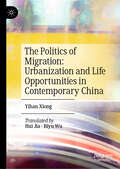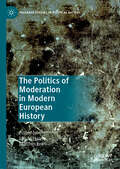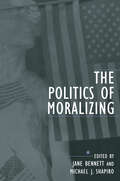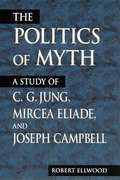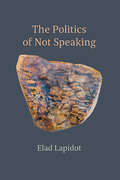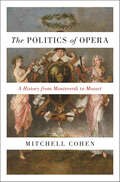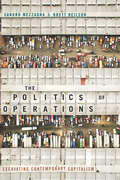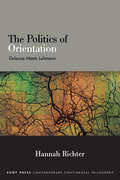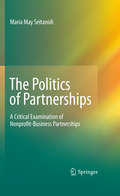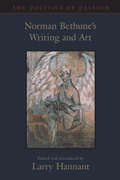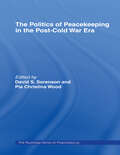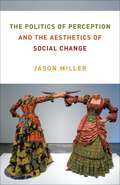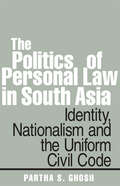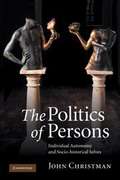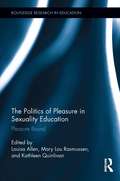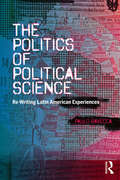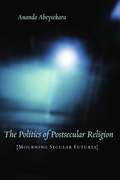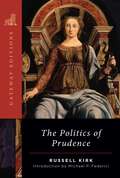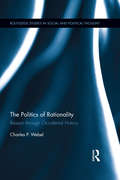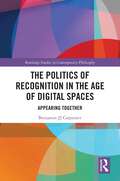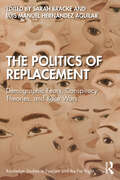- Table View
- List View
The Politics of Migration: Urbanization and Life Opportunities in Contemporary China
by Yihan XiongBased on extensive fieldwork and longitudinal studies, this book posits that the household registration (hukou) system is a fundamental institutional arrangement in contemporary China. It employs the theoretical framework of local citizenship to analyze the rights and conditions of the migrant population amidst urbanization. Local citizenship functions as both a governance classification and a qualification for access to public resources, influencing not only migration patterns but also the social mobility of various migrant classes. Importantly, the widely discussed education policies for migrant children are part of a broader framework of national migrant management and local industrial policies.
The Politics of Moderation in Modern European History (Palgrave Studies in Political History)
by Ido De Haan Matthijs LokThis book charts the varieties of political moderation in modern European history from the French Revolution to the present day. It explores the attempts to find a middle way between ideological extremes, from the nineteenth-century Juste Milieu and balance of power, via the Third Ways between capitalism and socialism, to the current calls for moderation beyond populism and religious radicalism. The essays in this volume are inspired by the widely-recognized need for a more nuanced political discourse. The contributors demonstrate how the history of modern politics offers a range of experiences and examples of the search for a middle way that can help us to navigate the tensions of the current political climate. At the same time, the volume offers a diagnosis of the problems and pitfalls of Third Ways, of finding the middle between extremes, and of the weaknesses of the moderate point of view.
The Politics of Moralizing
by Jane Bennett Michael J. ShapiroThe Politics of Moralizing issues a stern warning about the risks of speaking, writing, and thinking in a manner too confident about one's own judgments and asks, "Can a clear line be drawn between dogmatism and simple certainty and indignation?" Bennett and Shapiro enter the debate by questioning what has become a popular, even pervasive, cultural narrative told by both the left and the right: the story of the West's moral decline, degeneration, or confusion. Contributors explore the dynamics and dilemmas of moralizing by advocates of patriotism, environmental protection, and women's rights while arguing that the current discourse gives free license to self-aggrandizement, cruelty, vengeance and punitiveness and a generalized resistance to or abjection of diversity.
The Politics of Myth: A Study of C. G. Jung, Mircea Eliade, and Joseph Campbell
by Robert EllwoodEllwood (Religion, U. of Southern California) delves into the political views implicit in the mythological theories of probably the three best-known popularizers of myth in the 20th century. He points that all three emerged from the anti-modern pessimism and romanticism that also generated European fascism, and have all been accused of holding fascists and anti-Semitic sentiments. He assesses those charges in light of their entire career and lifetime contribution.
The Politics of Not Speaking
by Elad LapidotIn contrast to the common understanding of politics as a domain of speaking, reveals an alternative tradition where the spoken word fails, collapses, breaks (i.e., a politics of not speaking).According to a common conception, modern politics is based on speaking, on discussion and rational argumentation-on "logos." In contrast, The Politics of Not Speaking argues that politics is based not on speaking but on the suspension of conversation, on the break of rational discourse, on "logoclasm"-on politics of not speaking. Elad Lapidot presents the notion of politics as logoclasm through readings of five canonic thinkers of the twentieth century: Carl Schmitt, Martin Heidegger, Frantz Fanon, Gayatri Spivak, and Jacques Derrida. Tracing the development of the politics of not speaking from the 1930s to the 1990s, he shows how the notion of logoclasm, the rupture of rational discussion, explains key notions in modern politics, such as sovereignty, law, the state, violence, war, race, colonialism, decolonization, and boycott, and sheds light on current debates concerning the Boycott, Divestment, Sanctions (BDS) movement and the Gaza war.
The Politics of Objectivity
by Peter J. SteinbergerModern political conflict characteristically reflects and represents deep-seated but also unacknowledged and un-analyzed disagreements about what it means to be 'objective'. In defending this proposition, Peter J. Steinberger seeks to reaffirm the idea of rationalism in politics by examining important problems of public life explicitly in the light of established philosophical doctrine. The Politics of Objectivity invokes, thereby, an age-old, though now widely ignored, tradition of western thought according to which all political thinking is inevitably embedded in and underwritten by larger structures of metaphysical inquiry. Building on earlier studies of the idea of the state, and focusing on highly contested practices of objectivity in judgement, this book suggests that political conflict is an essentially discursive enterprise deeply implicated in the rational pursuit of theories about how things in the world really are.
The Politics of Opera: A History from Monteverdi to Mozart
by Mitchell CohenA wide-ranging look at the interplay of opera and political ideas through the centuriesThe Politics of Opera takes readers on a fascinating journey into the entwined development of opera and politics, from the Renaissance through the turn of the nineteenth century. What political backdrops have shaped opera? How has opera conveyed the political ideas of its times? Delving into European history and thought and an array of music by such greats as Lully, Rameau, and Mozart, Mitchell Cohen reveals how politics—through story lines, symbols, harmonies, and musical motifs—has played an operatic role both robust and sotto voce.Cohen begins with opera's emergence under Medici absolutism in Florence during the late Renaissance—where debates by humanists, including Galileo's father, led to the first operas in the late sixteenth century. Taking readers to Mantua and Venice, where composer Claudio Monteverdi flourished, Cohen examines how early operatic works like Orfeo used mythology to reflect on governance and policy issues of the day, such as state jurisdictions and immigration. Cohen explores France in the ages of Louis XIV and the Enlightenment and Vienna before and during the French Revolution, where the deceptive lightness of Mozart's masterpieces touched on the havoc of misrule and hidden abuses of power. Cohen also looks at smaller works, including a one-act opera written and composed by philosopher Jean-Jacques Rousseau. Essential characters, ancient and modern, make appearances throughout: Nero, Seneca, Machiavelli, Mazarin, Fenelon, Metastasio, Beaumarchais, Da Ponte, and many more.An engrossing book that will interest all who love opera and are intrigued by politics, The Politics of Opera offers a compelling investigation into the intersections of music and the state.
The Politics of Operations: Excavating Contemporary Capitalism
by Sandro Mezzadra Brett NeilsonIn The Politics of Operations Sandro Mezzadra and Brett Neilson investigate how capital reshapes its relation with politics through operations that enable the extraction and exploitation of mineral resources, labor, data, and cultures. They show how capital—which they theorize as a direct political actor—operates through the logistical organization of relations between people, property, and objects as well as through the penetration of financialization into all realms of economic life. Mezzadra and Neilson present a capacious analysis of a wide range of issues, from racial capitalism, the convergence of neoliberalism and nationalism, and Marx's concept of aggregate capital to the financial crisis of 2008 and how colonialism, empire, and globalization have shaped the modern state since World War II. In so doing, they illustrate the distinctive rationality and logics of contemporary capitalism while calling for a politics based on collective institutions that exist outside the state.
The Politics of Orientation: Deleuze Meets Luhmann (SUNY series in Contemporary Continental Philosophy)
by Hannah RichterThe Politics of Orientation provides the first substantial exploration of a surprising theoretical kinship and its rich political implications, between Gilles Deleuze's philosophy and the sociological systems theory of Niklas Luhmann. Through their shared theories of sense, Hannah Richter draws out how the works of Luhmann and Deleuze complement each other in creating worlds where chaos is the norm and order the unlikely and yet remarkably stable exception. From the encounter between Deleuze and Luhmann, Richter develops a novel take on postfoundational ontology where subjects and societies unfold in self-productive relations of sense against a background of complexity. The Politics of Orientation breaks and rebuilds theoretical alliances by reading core concepts and thinkers of Continental Philosophy, from Leibniz to Whitehead and Marx, through this encounter. Most importantly, the book puts Luhmann and Deleuze to work to offer urgently needed insight into the rise of post-truth populism. In our complex democratic societies, Richter argues, orientation against complexity has become the ground of political power, privileging the simplistic narratives of the populist right.
The Politics of Partnerships: A Critical Examination of Nonprofit-Business Partnerships
by Maria May SeitanidiThe widespread partnering phenomenon in the US and the UK spurred a significant amount of literature focusing on its strategic use. The Politics of Partnerships diverges by examining if partnerships can deliver benefits that extend beyond the organisational to the societal level resulting from the intentional combined efforts of the partners.
The Politics of Passion: Norman Bethune's Writing and Art
by Larry Hannant Norman BethuneThe Politics of Passion is the first comprehensive collection of the writing and art of Dr Norman Bethune. A Canadian medical pioneer and a communist, Bethune gained fame during the 1930s while serving in the Spanish Civil War and participating in China's struggle against Japanese invasion.This book sheds light on the man, the artist, and the revolutionary. It uncovers new historical material relating to several controversies surrounding Bethune. A remarkable document obtained from the Communist International Archives in Moscow, for instance, discusses why Bethune was sent home in disgrace from the Spanish Civil War. It refers to a mysterious Swedish woman, Kajsa von Rothman, who was Bethune's lover and who was believed by left-wing Spanish authorities to be politically suspect.This collection of Bethune's writings and art reveals that politics preoccupied him only during the last four years of his life. Earlier, his passionate nature found expression in medical and surgical innovation, as well as in painting, sketching, photography, writing - from poetry and short stories to letters, radio broadcasts, and plays - and public speaking. The Politics of Passion reveals the many sides of Bethune's identity, exploring not only the life of a revolutionary doctor, but of an intense and compassionate artist.
The Politics of Peacekeeping in the Post-Cold War Era (Cass Series On Peacekeeping Ser. #Vol. 17)
by David S. Sorenson Pia Christina WoodMost literature on peacekeeping narrowly focuses on particular peacekeeping operations, and the political bargaining between peacekeeping participants. However, there is very little published research on why nations actually commit forces to peacekeeping operations. This new book meets this need.The authors focus specifically on
The Politics of Perception and the Aesthetics of Social Change (Columbia Themes in Philosophy, Social Criticism, and the Arts)
by Jason MillerIn both politics and art in recent decades, there has been a dramatic shift in emphasis on representation of identity. Liberal ideals of universality and individuality have given way to a concern with the visibility and recognition of underrepresented groups. Modernist and postmodernist celebrations of disruption and subversion have been challenged by the view that representation is integral to social change. Despite this convergence, neither political nor aesthetic theory has given much attention to the increasingly central role of art in debates and struggles over cultural identity in the public sphere.Connecting Hegelian aesthetics with contemporary cultural politics, Jason Miller argues that both the aesthetic and political value of art are found in the reflexive self-awareness that artistic representation enables. The significance of art in modern life is that it shows us both the particular element in humanity as well as the human element in particularity. Just as Hegel asks us to acknowledge how different historical and cultural contexts produce radically different experiences of art, identity-based art calls on its audiences to situate themselves in relation to perspectives and experiences potentially quite remote—or even inaccessible—from their own. Miller offers a timely response to questions such as: How does contemporary art’s politics of perception contest liberal notions of deliberative politics? How does the cultural identity of the artist relate to the representations of cultural identity in their work? How do we understand and evaluate identity-based art aesthetically?Discussing a wide range of works of art and popular culture—from Antigone to Do the Right Thing and The Wire—this book develops a new conceptual framework for understanding the representation of cultural identity that affirms art’s capacity to effect social change.
The Politics of Personal Law in South Asia: Identity, Nationalism and the Uniform Civil Code
by Partha S. GhoshIt is a political study of the controversy surrounding the issue of the uniform civil code vis-à-vis personal laws from a South Asian perspective. At the centre of the debate is whether there should be a centralized view of the legal system in a given society or a decentralized view, both horizontally and vertically. This issue is entangled within the threads of identity politics, minority rights, women’s rights, national integration, global Islamic politics and universal human rights. Champions of each category view it through their own prisms, making the debate extremely complex, especially in politically and socially plural South Asia. So, this book attempts to harmonize the threads of the debate to provide a holistic political analysis.
The Politics of Persons: Individual Autonomy and Socio-historical Selves
by John ChristmanIt is both an ideal and an assumption of traditional conceptions of justice for liberal democracies that citizens are autonomous, self-governing persons. Yet standard accounts of the self and of self-government at work in such theories are hotly disputed and often roundly criticized in most of their guises. John Christman offers a sustained critical analysis of both the idea of the 'self' and of autonomy as these ideas function in political theory, offering interpretations of these ideas which avoid such disputes and withstand such criticisms. Christman's model of individual autonomy takes into account the socially constructed nature of persons and their complex cultural and social identities, and he shows how this model can provide a foundation for principles of justice for complex democracies marked by radical difference among citizens. His book will interest a wide range of readers in philosophy, politics, and the social sciences.
The Politics of Pleasure in Sexuality Education: Pleasure Bound (Routledge Research in Education)
by Louisa Allen Mary Lou Rasmussen Kathleen QuinlivanPleasure and desire have been important components of the vision for sexuality education for over 20 years. This book argues that there has been a lack of scrutiny over the political motivations that underpin research supportive of pleasure and desire within comprehensive sexuality education. In this volume, key researchers in the field consider how discourses related to pleasure and desire have been taken up internationally. They argue that sexuality education is clearly shaped by specific cultural and political contexts, and examine how these contexts have shaped the development of pleasure’s inclusion in such programs. Via such discussions, this volume incites a re-configuration of thought regarding sexuality education’s approach to pleasure and desire.
The Politics of Political Science: Re-Writing Latin American Experiences
by Paulo RaveccaIn this thought-provoking book, Paulo Ravecca presents a series of interlocking studies on the politics of political science in the Americas. Focusing mainly on the cases of Chile and Uruguay, Ravecca employs different strands of critical theory to challenge the mainstream narrative about the development of the discipline in the region, emphasizing its ideological aspects and demonstrating how the discipline itself has been shaped by power relations. Ravecca metaphorically charts the (non-linear) transit from “cold” to “warm” to “hot” intellectual temperatures to illustrate his—alternative—narrative. Beginning with a detailed quantitative study of three regional academic journals, moving to the analysis of the role of subjectivity (and political trauma) in academia and its discourse in relation to the dictatorships in Chile and Uruguay, and arriving finally at an intimate meditation on the experience of being a queer scholar in the Latin American academy of the 21st century, Ravecca guides his readers through differing explorations, languages, and methods. The Politics of Political Science: Re-Writing Latin American Experiences offers an essential reflection on both the relationship between knowledges and politics and the political and ethical role of the scholar today, demonstrating how the study of the politics of knowledge deepens our understanding of the politics of our times.
The Politics of Postsecular Religion: Mourning Secular Futures (Insurrections: Critical Studies in Religion, Politics, and Culture)
by Ananda AbeysekaraAnanda Abeysekara contends that democracy, along with its cherished secular norms, is founded on the idea of a promise deferred to the future. Rooted in democracy's messianic promise is the belief that religious-political identity-such as Buddhist, Hindu, Sinhalese, Christian, Muslim, or Tamil-can be critiqued, neutralized, improved, and changed, even while remaining inseparable from the genocide of the past. This facile belief, he argues, is precisely what distracts us from challenging the violence inherent in postcolonial political sovereignty. At the same time, we cannot simply dismiss the democratic concept, since it permeates so deeply through our modernist, capitalist, and humanist selves. In The Politics of Postsecular Religion, Abeysekara invites us to reconsider our ethical-political legacies, to look at them not as problems, but as aporias, in the Derridean sense-that is, as contradictions or impasses incapable of resolution. Disciplinary theorizing in religion and politics, he argues, is unable to identify the aporias of our postcolonial modernity. The aporetic legacies, which are like specters that cannot be wished away, demand a new kind of thinking. It is this thinking that Abeysekara calls mourning and un-inheriting. Un-inheriting is a way of meditating on history that both avoids the simple binary of remembering and forgetting and provides an original perspective on heritage, memory, and time. Abeysekara situates aporias in the settings and cultures of the United States, France, England, Sri Lanka, India, and Tibet. In presenting concrete examples of religion in public life, he questions the task of refashioning the aporetic premises of liberalism and secularism. Through close readings of Nietzsche, Heidegger, Arendt, Derrida, Butler, and Agamben, as well as Foucault, Asad, Chakrabarty, Balibar, and Zizek, he offers readers a way to think about the futures of postsecular politics that is both dynamic and creative.
The Politics of Protest in Hybrid Regimes
by Graeme B. RobertsonSince the end of the Cold War, more and more countries feature political regimes that are neither liberal democracies nor closed authoritarian systems. Most research on these hybrid regimes focuses on how elites manipulate elections to stay in office, but in places as diverse as Bolivia, Georgia, Kyrgyzstan, Serbia, Thailand, Ukraine, and Venezuela, protest in the streets has been at least as important as elections in bringing about political change. The Politics of Protest in Hybrid Regimes builds on previously unpublished data and extensive fieldwork in Russia to show how one high-profile hybrid regime manages political competition in the workplace and in the streets. More generally, the book develops a theory of how the nature of organizations in society, state strategies for mobilizing supporters, and elite competition shape political protest in hybrid regimes.
The Politics of Prudence
by Russell Kirk30th Anniversary Edition with a new introduction by Michael Federici.Conservatives are guided by prudence. So taught Russell Kirk (1918–1994), one of the founding fathers of American conservatism. If the tradition of prudential politics has fallen on hard times, its comeback might well begin in the pages of this wise book. An understanding of prudence as practical wisdom, the capacity of choosing the right means to attain worthy ends, is much needed in our time. It is the virtue most associated with the statesman. Distinguishing political prudence from ideology, Kirk examines ten principles, events, books, and thinkers that have shaped the conservative mind and heart. The final chapter examines the shortcomings of democracy throughout the world and the need for representative government conducted by temperate and thoughtful men and women. In an eloquent epilogue, Kirk calls the rising generation to the defense of order—both the moral order and the social order, the order of the soul and the order of society—against the enemies of justice, freedom, and a high culture. Reflecting decades of learning and practical experience, this lucid book is Kirk's bequest to the young men and women of today, an instruction manual for redeeming the time.
The Politics of Rationality: Reason through Occidental History (Routledge Studies in Social and Political Thought)
by Charles WebelWhat are reason and rationality? How significant are recent postmodernist and neuroscientific challenges to these longheld notions? Should we abandon a belief in reason and an adherence to rationality? Or can reason and rationality be reformulated and reframed? And what does politics have to do with how we think about reason and why we act more or less rationally? The Politics of Rationality differs from other books with "reason" or “rationality” due to its historical, political, depth-psychological, and multidisciplinary approach to understanding reason through history. Charles P. Webel eloquently clarifies the links among ideas, their creators, the relevant mental processes, and the political cultures within which such important concepts as reasons and rationality take hold. He demonstrates how reason and rationality/irrationality have become what they mean for us today and proposes a way to rethink reason and rationality in light of the withering critiques leveled against them. In doing so, he presents a "history of reason and rationality" by examining the intellectual and political contexts of four representative theorists of reason and rationality-- Plato, Machiavelli, Kant, and Weber—and by addressing contemporary challenges posed by postmodernism, depth psychology, and neurophilosophy.
The Politics of Recognition in the Age of Digital Spaces: Appearing Together (Routledge Studies in Contemporary Philosophy)
by Benjamin JJ CarpenterThis book provides a philosophical analysis of the notion of selfhood that underlies identity politics. It offers a unique theory of the self that combines previous scholarly work on recognition and the phenomenology of space. The politics of identity occupy the centre of a contested terrain. Marginalised and oppressed peoples continue to seek the transformation of our shared social world and our political institutions required for their lives to be liveable. Public criticism and academic treatments of identity politics often take a disparaging view that treats it as subordinate to more general political questions about justice and the organisation of society and its institutions. This book argues that these polemics ignore the numerous ways in which all politics is concerned with matters of selfhood and identity. Through a rereading of Hegel’s account of recognition as an ongoing and dynamic process that constitutes the self, it presents selves—and the categories of identity that qualify these selves—as fundamentally conditioned by the environments in which they appear before themselves and others. It also argues that we do the work of identity in public spaces—particularly digital spaces—and that these spaces shape what identities we can assume and what those identities mean. Contemporary social media technologies facilitate the production of particular forms of selfhood through the combined logics of the interface, the profile, and the post. The Politics of Recognition in the Age of Digital Spaces will be of interest to scholars and advanced students working in a wide range of disciplines including political philosophy, phenomenology, philosophy of technology, sociology, political theory, and critical theory. It will also appeal to anyone with an interest in contemporary identity politics, whether as a matter of study or lived experience.
The Politics of Replacement: Demographic Fears, Conspiracy Theories, and Race Wars (Routledge Studies in Fascism and the Far Right)
by Sarah Bracke Luis Manuel Hernández AguilarThe Politics of Replacement explores current demographic conspiracy theories and their entanglement with different forms of racism and exclusionary politics such as sexism. The book focuses on population replacement conspiracy theories, i.e. those imaginaries and discourses centered on the idea that the national population is under threat of being overtaken or even wiped out by those considered as “alien” to the nation, and that this is the result of concerted efforts by “elites”. Replacement conspiracy theories are on the rise again: from Eurabia fantasies to Renaud Camus’ The Great Replacement, white supremacist discourses are thriving and increasingly broadcasting in mainstream venues. To account for their rise and spread, this edited volume brings together research on various dimensions of population replacement conspiracy theories: different theoretical and methodological approaches, different social scientific and humanities (inter)disciplinary backgrounds, different geographical case-studies (across Europe, North America, Southeast Asia, and Oceania), different time-periods (medieval archives, colonial archives, Nazi archives, post-colonial migrations, post-9/11), and different forms of racialization and racisms (Islamophobia, antisemitism, racism against migrants and refugees), as well as with the entanglement of population replacement discourse with gendered violence. The book is organized into four sections: (1) exploring the historical background of the current rise of demographic conspiracy theories; (2) tracing the (neoliberal) governmentalities in and through which replacement discourse operates; (3) analysing the particularly intense focus on the threat of Muslims in contemporary replacement conspiracy theories, and (4) investigating the connection between replacement conspiracies, gender, and violence. This title is essential reading for scholars, journalists, and activists interested in the contemporary far right, conspiracy theories, and racisms.
The Politics of Representation in the Global Age
by Peter A. Hall Peter A. Hall Wade Jacoby Jonah Levy Sophie Meunier Wade Jacoby Jonah LevyHow has the process of political representation changed in the era of globalization? The representation of interests is at the heart of democracy, but how is it that some interests secure a strong voice, while others do not? While each person has multiple interests linked to different dimensions of his or her identity, much of the existing academic literature assumes that interests are given prior to politics by a person's socioeconomic, institutional, or cultural situation. This book mounts a radical challenge to this view, arguing that interests are actively forged through processes of politics. The book develops an analytic framework for understanding how representation takes place - based on processes of identification, mobilization, and adjudication - and explores how these processes have evolved over time. Through a wide variety of case studies, the chapters explore how actors identify their interests, mobilize them into action, and resolve conflicts among them.
